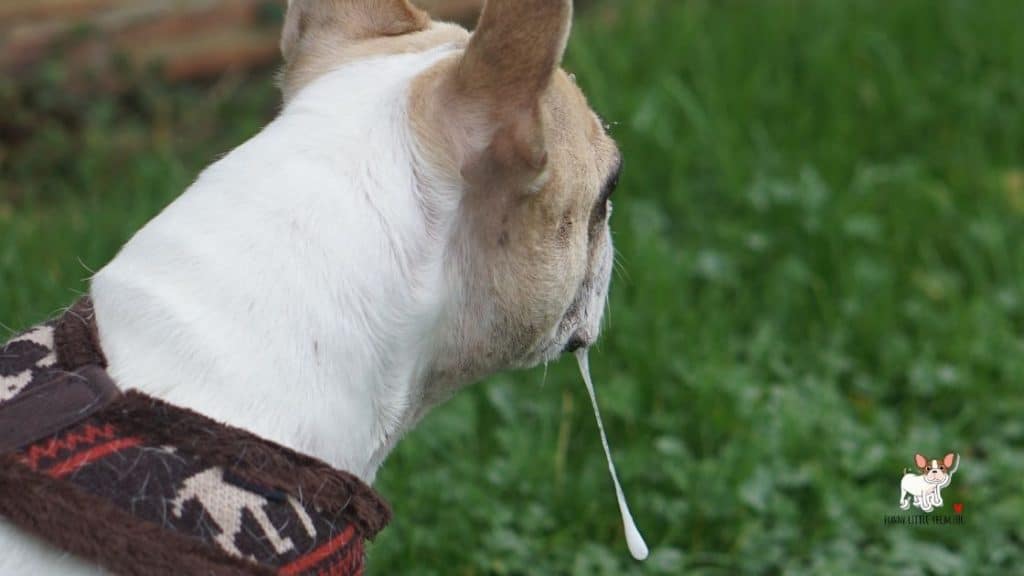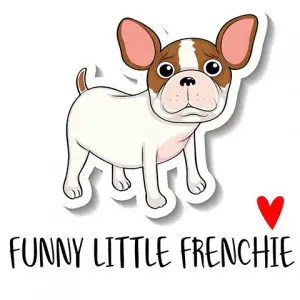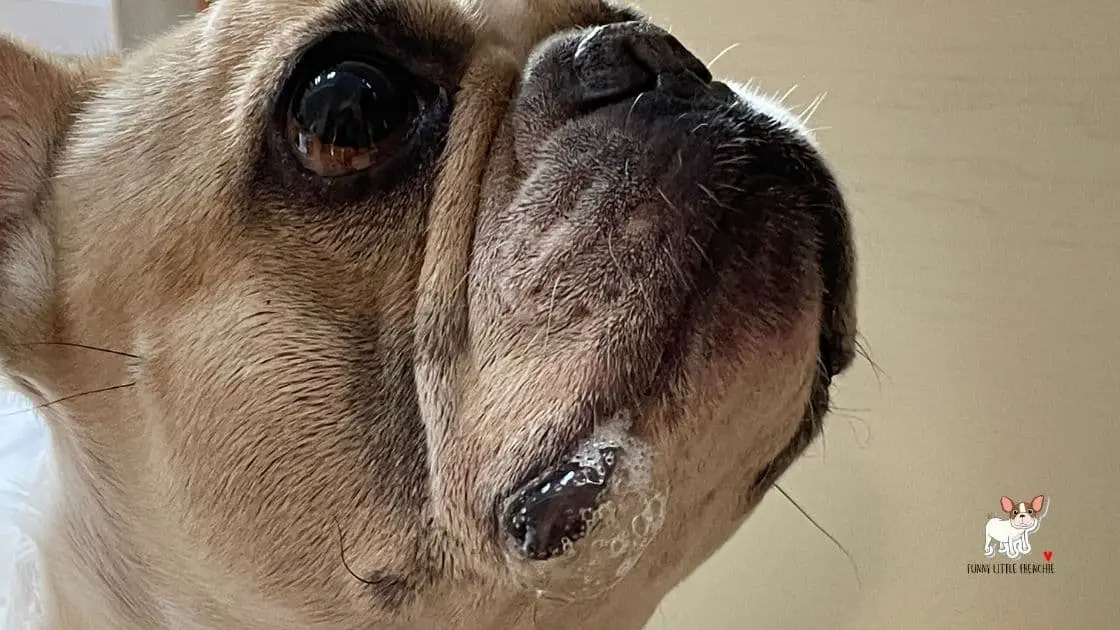French Bulldogs do drool a little more than other dogs because of their facial structure. French Bulldogs are part of the brachycephalic group of dog breeds. This means that they have a shortened and dis-formed facial structure around their muzzle and airways.
Why is my French Bulldog drooling?
It isn’t uncommon for French Bulldogs to drool. Their facial anatomy means that they are more likely to drool than some other breeds. However, it is important to understand the difference between normal and excessive drooling. There isn’t much wrong with a little drooling here and there. But, excessive drooling could be a sign of ill health or anxiety.
Po forms this spectacular drool bubble on one side of her mouth when she watches me eat. It gets bigger and bigger in anticipation of the sneaky morsel of ham that she knows I’m going to give her! This is a perfect example of classical conditioning that Russian scientist Pavlov studied in the 1890’s.
studied in the 1890’s.
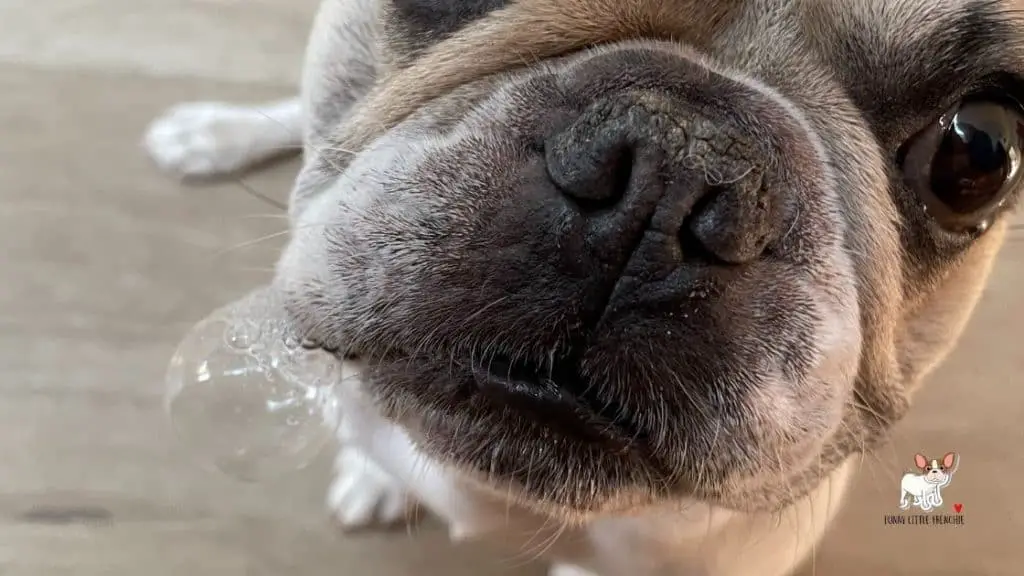
Why is my Frenchie puppy drooling?
There may be times where your French Bulldog puppy appears to be drooling more than it should. Frenchie puppies may drool more when they are teething, especially with their facial structure. Puppies that drool a lot may also do so because they like to chew. Watch out for other signs of distress to determine whether there is any cause for alarm. Often, drooling in Frenchie puppies will regulate itself with time.
Common reasons for excessive French bulldog drooling.
1) Over-excitement.
2) Anxiety due to stressful environmental triggers.
3) Anxiety due to separation.
4) Overexertion in the dog park or on a walk.
5) Mouth injuries or dental issues.
6) Other health issues such as illness or poisoning.
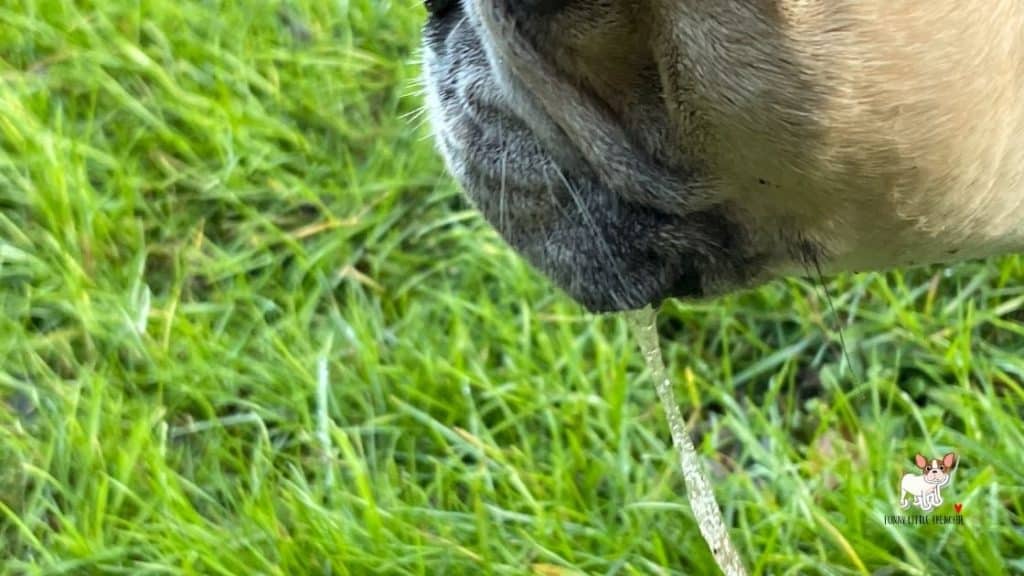
Excessive drooling could be a sign of bigger issues
While a little bit of drool now and then isn’t a cause for alarm, you should watch out for any excessive drooling. This is where the drooling becomes far more common or there is a lot of it to deal with. Frenchies often drool in response to emotional stimuli.
Therefore, you could find that the drooling is a positive response to excitement. However, there are also negative stimuli that cause excessive saliva production.
If you start to notice your dog drooling excessively, you need to start some detective work to try and figure out the cause. Try and figure out if there is a correlation and perhaps causation between certain situations and triggers. The sooner you do so, the easier it is to help your pet.
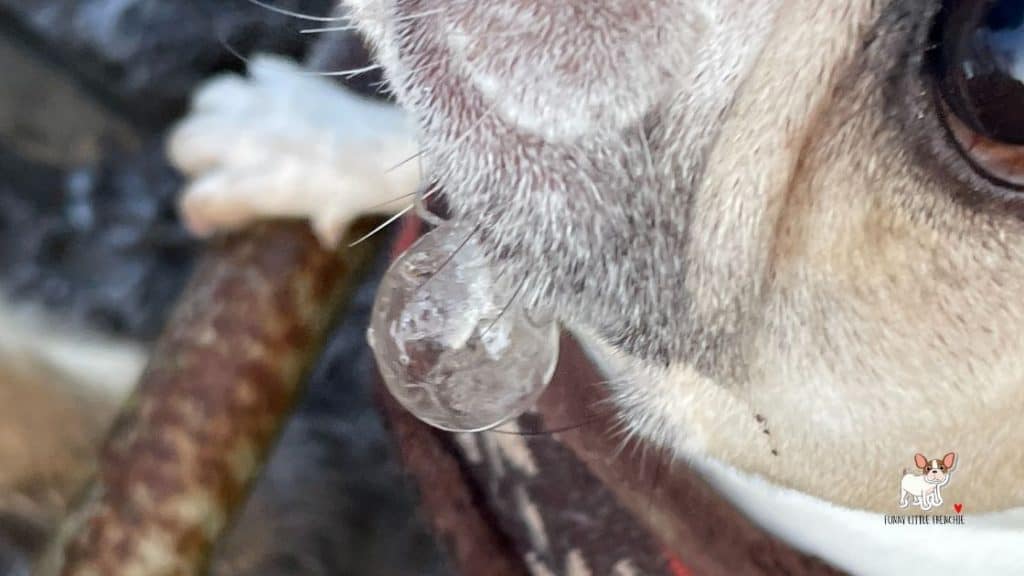
Drooling is often a sign of anxiety or stress.
Let’s start with the risk to your dog’s mental health. Drooling is often a sign of anxiety or stress. This may relate to a sudden trigger in their environment or a much deeper anxiety disorder. Try and determine the root cause. For example, do they drool excessively when there are thunderstorms or firework displays? Do they get stressed out around other animals or people? Minimizing exposure to a trigger could make a big difference.
Then there are the issues of separation anxiety. You might find that your dog is covered in drool when you get home from work, but doesn’t drool so much when they are with you. The solution here is to work on your training to leave the dog alone in a better state of mind. Or, you can try to minimize the amount of time they are alone.
Dental and mouth issues
Then there are the risks to their physical health. Dental and mouth problems could further disfigure the structure and function of the mouth so that they can’t contain their saliva. But, there are also deeper issues with organ health and poisoning to watch out for. For example, your dog may salivate excessively and quickly after eating something it finds in the countryside. In these cases, you must act fast.
Has your frenchie eaten a wasp?
Po was sitting in the garden one summer’s day when I looked across and saw that she was drooling really badly from one side of her mouth. When I looked again, I noticed that her muzzle was swollen on one side.
I couldn’t see any injury, or a bee sting so I assumed it was a wasp, but rang our the vet just in case. They agreed that she had probably been stung by a wasp so I gave her an antihistamine to reduce the swelling and kept an eye on her breathing in case it got worse.
Thankfully the swelling went down and the drooling stopped and all was fine. Needless to say, Po is not too keen on those yellow and black insects. When they come near her, she barks.
What other signs can help you work out why your dog is drooling?
Drooling on its own isn’t always enough to determine whether your pet has some additional condition to worry about. Dogs that drool because of anxiety may exhibit other signs, such as pacing, whining, or other signs of emotional distress. With separation anxiety, there may also be signs of destructive behavior.
When it comes to physical illnesses, you can give your pet a little check-up and watch out for other symptoms. Dogs that may be exhausted could show signs of dizziness, fatigue, or an inability to get enough air.
Dogs that have issues with their mouth and dental hygiene may simply need a check-up. Take a look at their mouths and teeth for signs of infection, broken teeth, or even tooth loss. Regular cleaning and dental checks at home should minimize the risks of excess saliva production.
When to consult a vet about drooling
If you are concerned about excessive drooling, especially if it is sudden, profound, and with no clear cause, go and see your vet. The best-case scenario is that they will find a simple cause – like overexertion or short-term stress – that is easily rectified with simple treatment options. The worst-case scenario is that your dog has an underlying issue with its organs or poisoning and requires immediate emergency medical care.
The sooner that you get your pet to a vet, the sooner you can get the problem under control. It is better to be safe than sorry.
In summary, why do Frenchies drool so much?
In short, there are two different types of Frenchie drooling. The normal kind is fine and you can expect a little drool from these brachycephalic breeds. Excessive drool could be a sign of some deeper physical or emotional stress. The sooner that you can to the bottom of the issue and determine the cause, the better the chance that your pet will get over the problem.
Don’t dismiss any sudden change as something cute. There is nothing wrong with being overprotective if it turns out that there is a bigger issue to deal with.
